Why Dutch Rabbits Are Known for Their Friendly Nature
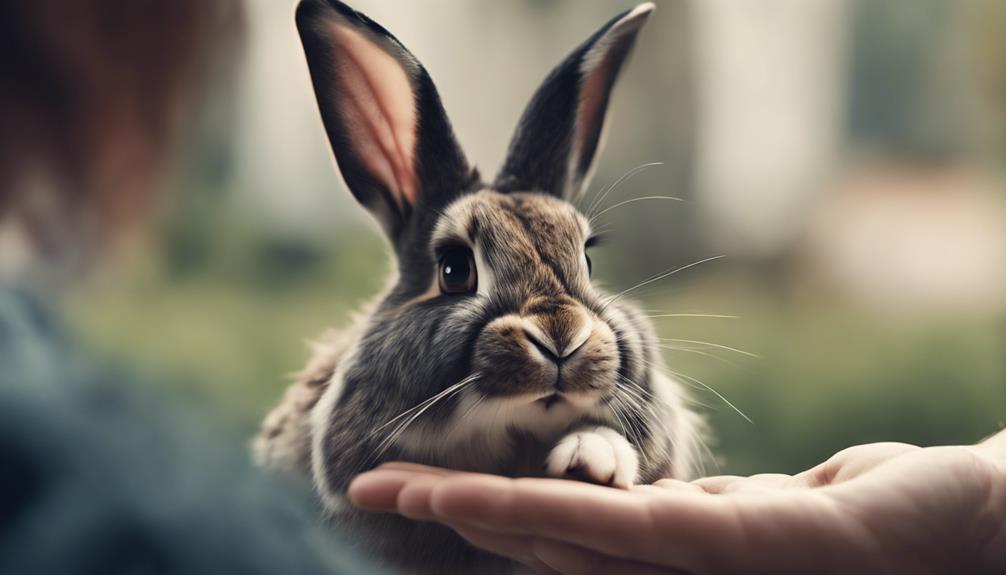
Dutch rabbits are a breed known for their distinctive appearance, characterized by their short, compact bodies and striking coat patterns, typically featuring a solid base color with white markings on the face, belly, and feet.
Originally bred in the Netherlands in the 19th century, Dutch rabbits have become one of the most recognizable and beloved rabbit breeds worldwide.
Their small to medium size, gentle temperament, and relatively easy care requirements make them an ideal pet for both first-time rabbit owners and experienced enthusiasts alike.
Dutch Rabbit Breed Origin
How did the Dutch rabbit breed originate and what makes it unique among other rabbit breeds?
The Dutch rabbit breed, which originated in England during the 19th century, is a product of crossing various rabbit breeds, including the Brabancon. What sets the Dutch rabbit apart are its distinct and striking markings, with a white base coat and colored patches on the body, face, and ears.
This characteristic appearance quickly caught the eye of rabbit enthusiasts, leading to Dutch rabbits being prominently featured in early rabbit exhibitions. Beyond their aesthetic appeal, Dutch rabbits are known for their friendly nature and sociable temperament, making them a beloved choice among rabbit enthusiasts.
Their amiable disposition makes them excellent companions and pets, as they enjoy human interaction and are easily tamed. This engaging trait has solidified the Dutch rabbit’s reputation as a cherished breed among those seeking a friendly and affectionate rabbit companion.
Social Behavior of Dutch Rabbits
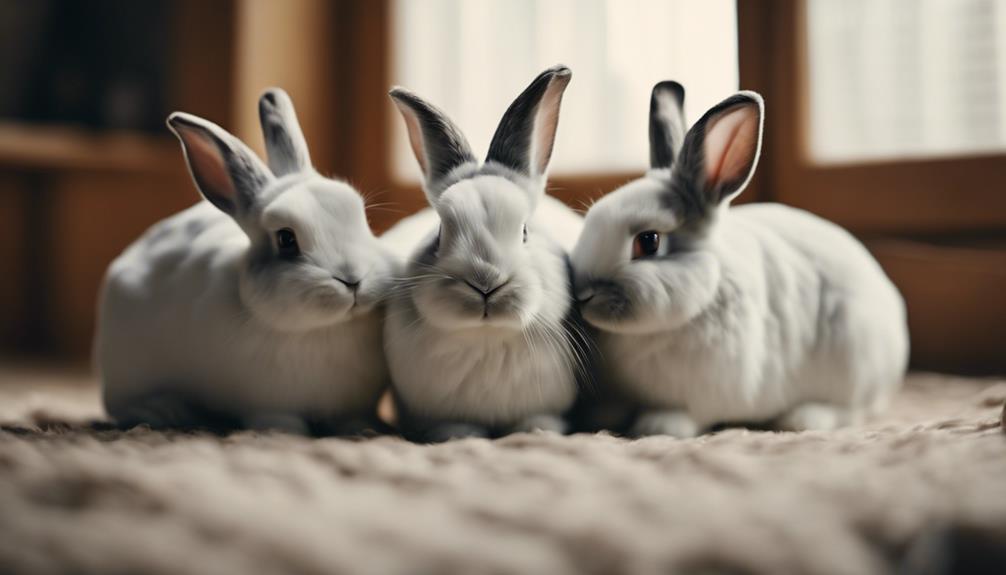
Dutch rabbits demonstrate fascinating group dynamics, often engaging in intricate communication patterns within their social groups. Understanding these interactions sheds light on the complexities of their social behavior.
Observing how Dutch rabbits communicate and interact with one another provides valuable insight into their friendly and sociable nature.
Dutch Rabbits’ Group Dynamics
When considering the social behavior of Dutch rabbits, their inclination towards communal living becomes evident through their demonstrative display of companionship and cooperative interactions within a group setting. Dutch rabbits are social animals that thrive in multi-rabbit households, where they exhibit friendly behavior and a strong sense of community.
Group dynamics play a crucial role in their mental and emotional health, with companionship serving as a key factor in their overall well-being. Within a group, these rabbits engage in playful behaviors, fostering a harmonious environment through their cooperative interactions.
Their friendly nature extends to their fellow rabbit companions, as they display gentle and sociable behaviors that contribute to the cohesive dynamics within the group.
Communication Among Dutch Rabbits
Communication among Dutch rabbits is a vital aspect of their social behavior, encompassing a range of body language cues and vocalizations.
- Body Language Cues: Dutch rabbits communicate through various gestures like thumping to express fear or warning, grooming to bond with companions, and nudging to establish hierarchy.
- Hierarchy Establishment: Within their groups, Dutch rabbits establish a hierarchy to maintain order and structure.
- Vocalizations: Vocal cues such as soft grunts and honking sounds are used by Dutch rabbits for intra-group communication.
- Social Interactions for Mental Stimulation: Engaging in social interactions provides Dutch rabbits with mental stimulation, contributing to their overall well-being and reinforcing their friendly nature.
Characteristics That Make Dutch Rabbits Friendly
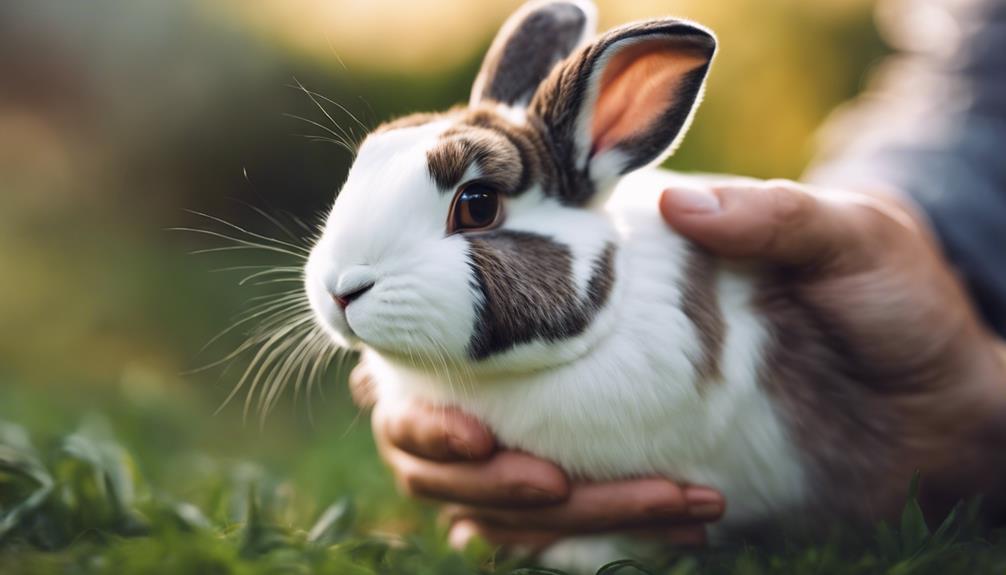
Often characterized by their calm demeanor and gentle disposition towards humans, Dutch rabbits exhibit a friendly nature that makes them ideal companions for families and individuals alike. Their sociable behavior, intelligence, and trainability contribute to their amiable characteristics. Dutch rabbits enjoy human interaction and thrive on attention, making them excellent pets for households with children. Their curiosity and playful nature further enhance their friendliness, offering engaging companionship. Additionally, their manageable size and robust build make them easy to handle, fostering positive relationships with their owners. The combination of a calm temperament, gentle disposition, sociable behavior, intelligence, trainability, curiosity, and playfulness distinguishes Dutch rabbits as friendly and affable pets. The following table summarizes the key characteristics that make Dutch rabbits known for their amiable nature:
| Characteristic | Description |
|---|---|
| Calm Temperament | Easy-going and composed demeanor towards humans. |
| Gentle Disposition | Kind and mild manner when interacting with people. |
| Sociable Behavior | Enjoy human interaction and thrive on attention. |
| Intelligent | Display cognitive abilities and quick learning. |
| Trainable | Responsive to handling and suitable for teaching tricks. |
| Curious | Display inquisitive behavior towards their environment. |
| Playful | Engage in lively and entertaining activities, adding to their amiable nature. |
Bonding With Dutch Rabbits
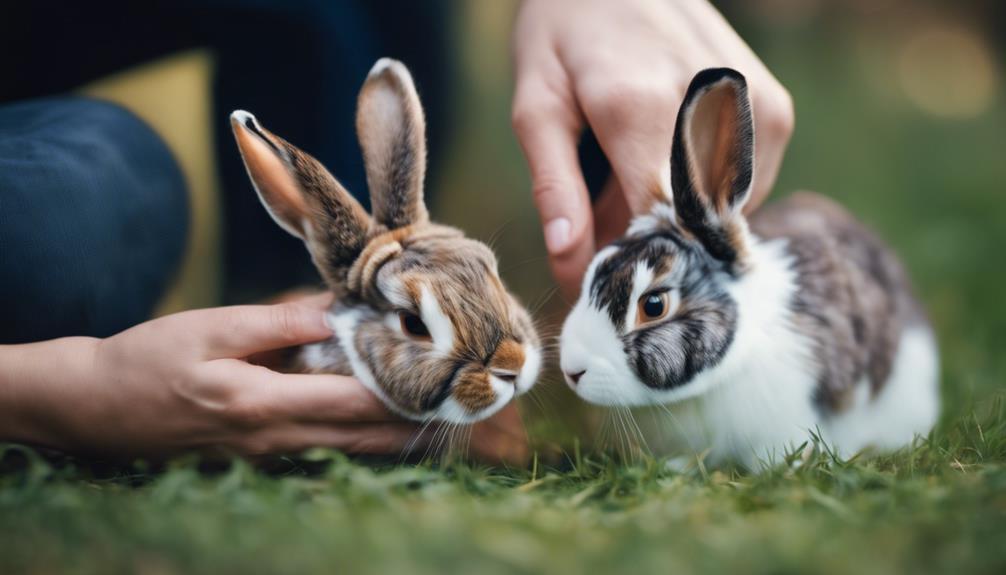
Establishing a strong bond with Dutch rabbits can greatly enhance their well-being and enrich the owner’s experience of pet ownership. Dutch rabbits, with their friendly nature and calm disposition, are a joy to bond with due to their excellent interaction skills. Here are some insights on bonding with Dutch rabbits:
- Curious Behavior: Their inquisitive nature makes them open to exploring their surroundings and engaging with their owners, fostering a deeper connection.
- Intelligent and Trainable: Dutch rabbits aren’t only friendly but also intelligent, making them receptive to training and mental stimulation, which can strengthen the bond between the rabbit and its owner.
- Regular Interaction: These rabbits thrive on regular interaction and attention, enjoying playtime and companionship, which are crucial for building a close bond.
- Living in Pairs: Dutch rabbits are sociable animals that exhibit their friendly nature not only towards humans but also towards other rabbits, making them ideal for living in pairs for enhanced companionship and socialization opportunities.
Training Dutch Rabbits for Friendliness
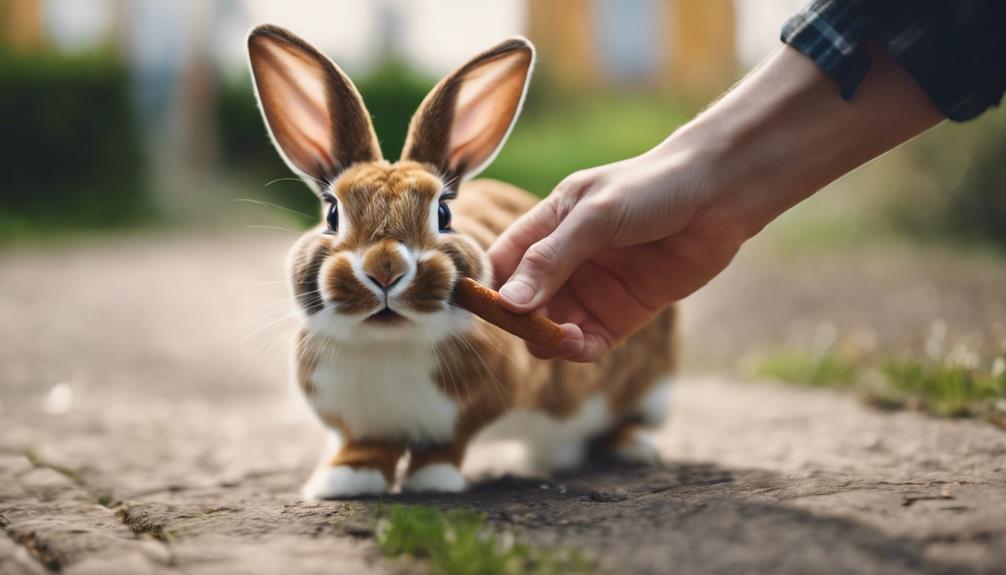
To cultivate friendliness in Dutch rabbits, owners can implement positive reinforcement techniques during training sessions. Dutch rabbits are intelligent animals, making them trainable for social interactions with humans. Regular handling plays a crucial role in their development of friendly and sociable behavior. By providing positive reinforcement such as treats, praise, or rewards when the rabbit displays friendly behavior, owners can reinforce and encourage these traits. Additionally, creating a stimulating environment with toys and activities can enhance their friendliness by keeping them engaged and mentally stimulated.
Attention and companionship are key factors in training Dutch rabbits to be friendly. These animals thrive on human interaction and form strong bonds with their owners when given the time and attention they require. Through consistent training, affection, and positive reinforcement, Dutch rabbits can become notably affectionate and responsive pets. Owners who invest the effort in training their Dutch rabbits for friendliness will likely be rewarded with a loving and interactive companion.
Interacting With Dutch Rabbits
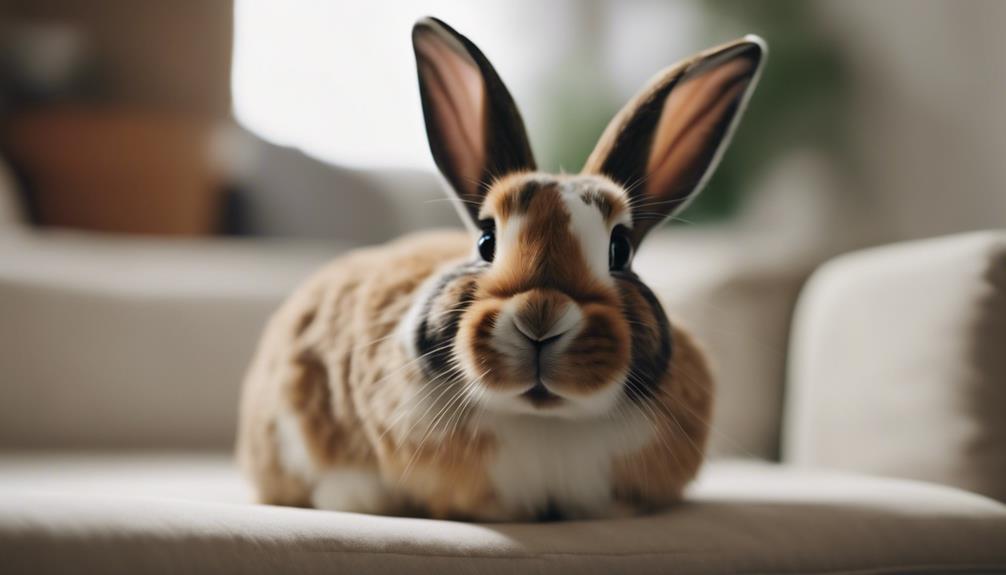
Dutch rabbits’ gentle temperament traits make them ideal companions for human interaction, fostering strong bonds with their owners. By enjoying attention and responding well to training, Dutch rabbits actively seek out socialization opportunities.
Their sociable behavior and intelligence contribute to their reputation for friendliness, making them cherished pets that thrive on human companionship.
Gentle Temperament Traits
With their gentle temperament and sociable demeanor, Dutch rabbits effortlessly captivate owners with their friendly nature and ease of interaction. Dutch rabbits exhibit several traits that contribute to their reputation as ideal companions:
- Gentle Temperament: Dutch rabbits are known for their calm demeanor, making them well-suited for families with children.
- Sociable Behavior: These intelligent animals enjoy interacting with their owners, showing a friendly and welcoming attitude.
- Easy to Train: Their intelligence and willingness to learn make Dutch rabbits easy to train, even for novice owners.
- Beloved Pets: The combination of their friendly nature, sociable behavior, and ease of handling has made Dutch rabbits popular and beloved pets worldwide.
Bonding With Humans
Interacting with Dutch rabbits allows owners to experience firsthand the remarkable bond that these gentle creatures effortlessly cultivate through their friendly and engaging demeanor. Their calm disposition and gentle demeanor make them particularly adept at forming strong connections with humans based on trust and affection.
Dutch rabbits actively seek out interactive play and respond positively to attention, displaying their affectionate nature. They’re patient and tolerant, making them ideal companions for children who enjoy cuddling and playtime. Through consistent socialization and positive experiences, Dutch rabbits develop deep bonds with their owners, showcasing their friendly and trusting disposition.
This mutual trust and affectionate bond highlight the unique and rewarding relationship that can be established between humans and Dutch rabbits.
Dutch Rabbits in Multi-Pet Homes
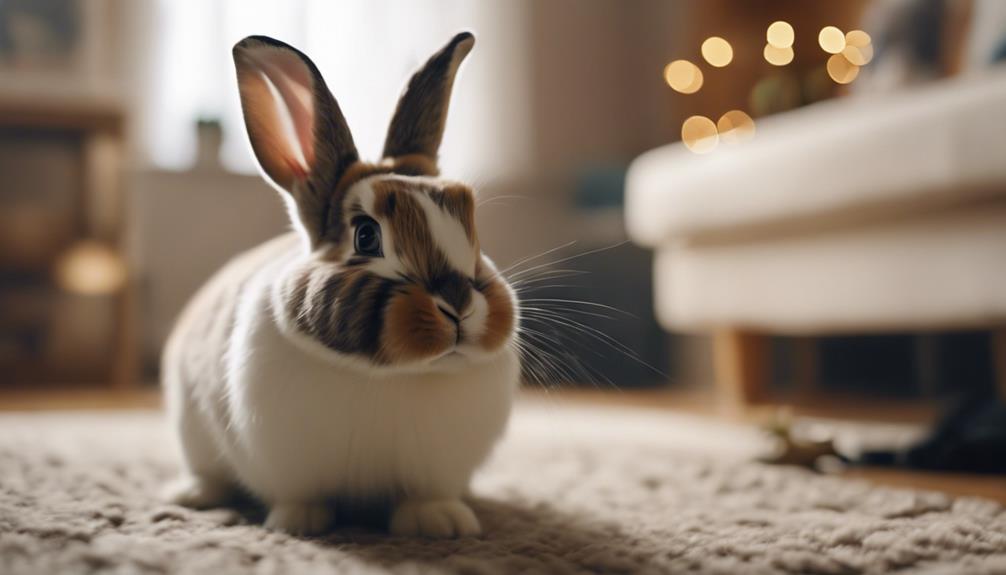
In multi-pet homes, Dutch rabbits demonstrate their sociable nature by forming positive relationships with other animals. Here’s why they thrive in such environments:
- Interactions with Various Animals: Dutch rabbits enjoy socializing with different pets like cats, dogs, and fellow rabbits, showcasing their friendly and adaptable demeanor.
- Fostering Positive Relationships: Their gentle disposition allows them to establish harmonious connections with other pets, creating a joyful atmosphere within the household.
- Building Strong Bonds: When introduced properly and supervised, Dutch rabbits can develop strong bonds with their furry housemates, enhancing the well-being of all animals involved.
- Bringing Joy to the Household: With their playful and curious nature, Dutch rabbits infuse a sense of companionship and delight into multi-pet homes, making them valuable additions to the family dynamic.
Frequently Asked Questions
Are Dutch Rabbits Friendly?
Dutch rabbits are friendly social animals with playful and gentle demeanors. They make affectionate pets, providing bonding opportunities with their interactive personalities. Their easygoing disposition and loyalty make them good-natured companions, ideal for those seeking loyal friends.
What Is the Friendliest Bunny in the World?
When it comes to bunny behavior and rabbit temperament, the friendliest bunny in the world is the Dutch rabbit. These small animals make great animal companions, thriving on social interactions and playful moments with their owners.
What Is the Personality of a Dutch Rabbit?
A Dutch rabbit’s personality is a delightful mix of playful antics, gentle demeanor, and curious nature. They thrive on social interactions, displaying affectionate behavior and intelligent companionship. These energetic buddies are loyal friends with a mischievous streak.
What Is a Fun Fact About Dutch Rabbits?
Dutch rabbits’ markings showcase their unique beauty, adding to their charm as pets. With a lifespan of 5-8 years, they thrive on a diet rich in hay and veggies. Their grooming needs are minimal, but they require ample exercise for optimal health.









